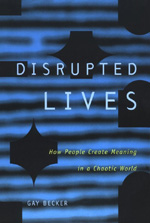 (Reprinted with permission from the journal Sociology of Health and Illness.)
(Reprinted with permission from the journal Sociology of Health and Illness.)
For “Mind,” states the index of this book, see “Body.” It is a directive that, in many ways, tells us much about the overall content of Disrupted Lives: How People Create Meaning in a Chaotic World. The author, Gay Becker, is concerned to examine the lives of people who attempt to “create continuity after an unexpected disruption to life.” Her chosen method of examination is to get her subjects to provide a narrative of the events that have affected them. Disruption, of course, calls in various forms, and so the author uses research data derived from various categories of people to examine her theme. For example, around 170 infertile couples are used as the basis for a discussion on the effects of infertility. Interviews from some twenty people are used as the basis for an investigation into various kinds of midlife crises. Over 200 people in the “Stroke Study” were asked to reflect on the effects of chronic illness in later life, and a further forty people were interviewed about other kinds of disruptive events in later life. Finally, twenty-four African-Americans were interviewed about the effects of a worsening chronic illness on their daily lives.
One of the main theses of Becker’s book is that Western culture emphasizes predictability and order about the life course and the events within it. Yet, in any society, disruption is an inevitable component of the human condition. So how do people whose lives are disrupted reconstruct any sense of continuity and order? What kinds of moral accounts of their lives do people give? And what form do those accounts take? In attempting to answer those questions, Becker not only provides fascinating insight into the lives of her subjects, but also reflects thoughtfully on the philosophical and anthropological issues that are associated with them. It is in this latter respect that the body and embodiment loom large. For, “the body remembers,” and thoughts, feelings, and strategies for re-establishing a normal life are all, according to Becker, embodied. It is a distinctive existentialist stance. The use of narrative is, as such, merely a strategy for focusing on the embodied nature of disruption.
Not so long ago, the body, in sociology generally and in the sociology of health and illness in particular, was invisible. It is, happily, no longer so. Since the 1980s, the sociology of the body and concerns with embodiment have advanced apace. Yet in that advance one cannot help but sense the demise of another entity. That entity is mind. Mind is reduced to body—either in the form of brain chemicals, neurotransmitters, and the like, or, as here, in the much vaguer notion of embodied pain and disruption. For “Mind,” see “Body.” So ends the century that cherished Freudian psychology through its infancy.
This unsigned review first appeared in the journal Sociology of Health and Illness. Reprinted with permission.